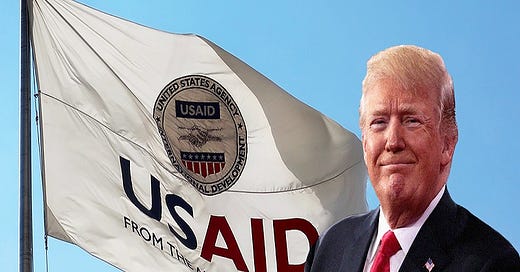American influence might rebound in the Global South since a large part of why many of these countries started turning away from the US since the start of the century was due to it violating their sovereignty by funding “NGOs” that meddle in their affairs.
One of the Executive Orders that Trump just signed suspends some foreign aid for 90 days, specifically “development assistance funds to foreign countries and implementing non-governmental organizations, international organizations, and contractors”, in order to assess their “efficiencies and consistency with US foreign policy”. It remains unclear at the time of writing whether the State Department’s subsequent “stop-work orders” will affect military aid to Ukraine so that possibility won’t be covered in this analysis.
Most foreign aid programs have been exploited to meddle in other countries’ affairs by funding anti-government and even in some cases anti-state movements that later orchestrate Color Revolutions. Even if they’re not taken to that extreme, they at the very least create problems for the implementation of those countries’ domestic and foreign policies by artificially manufacturing grassroots opposition to them, which manipulates perceptions of their popularity and can thus influence national elections.
Such was recently the case in Georgia, which fended off a nearly-two-year-long Western-backed but superficially “NGO”-driven campaign against the ruling party. This was officially waged in response to their FARA-inspired foreign agents law but was really punishment for them pragmatically refusing to sanction Russia and open up a “second front” against it in the South Caucasus during Ukraine’s failed summer 2023 counteroffensive. Georgia can now rest a bit easier for the time being.
The same goes for the many African countries like new BRICS partner Uganda who’ve been aggressively pressured by American-backed “NGOs” into accepting the normalization of LGBT+ in contravention of their traditional values. As put forth in Trump’s Executive Order, “The United States foreign aid industry and bureaucracy…serve to destabilize world peace by promoting ideas in foreign countries that are directly inverse to harmonious and stable relations internal to and among countries.”
Observers also shouldn’t forget about India after the US meddled in last year’s elections despite their strategic partnership. Russia gave voice to India’s concerns at the time due to the sensitivity of India calling the US out while the political process was ongoing, after which the ruling BJP accused the State Department and the “deep state” of meddling in other matters last month. While independently financed Soros still remains a problem, the US government shouldn’t be one for now, to India’s relief.
Less political meddling and socio-cultural engineering, at least for the next three months, will be much appreciated by all those countries that have been targeted by “NGO”-driven Hybrid War. The emphasis is on less of these efforts as opposed to their complete freeze since some programs might have enough funds left to partially operate during the interim while the Secretary of State can issue waivers for specific ones at his discretion. Some might therefore continue in full but most will be adversely affected.
The end effect is that American influence might rebound in the Global South since a large part of why many of these countries started turning away from the US since the start of the century was due to it violating their sovereignty by funding “NGOs” that meddle in their affairs. If Trump reforms the US’ international lending strategy to remove political strings on aid programs, including from those institutions that it controls like the IMF and World Bank, then this process would further accelerate.
His promised imposition of more tariffs might trouble some of these same countries, but it’s not the same as coercing them into making political and socio-cultural changes against their will in exchange for emergency financial aid, which ultimately risks destabilizing them and later advancing regime change. This potentially new approach could restore some of the attractiveness in partnering with the US by partially evening the odds vis-à-vis its competitions with China and Russia in the Global South.
In the event that this comes to pass, then those two would be compelled to offer better deals to their partners in order to prevent them from being enticed by the US into accepting whatever it proposes, thus possibly catalyzing a cycle of competition that works to those other countries’ benefit. For that to happen, the US would have to treat its partners more as equals and less as vassals, but old habits die hard so this can’t be taken for granted even if Trump appears somewhat (key qualifier) interested in it.





Very well: most foreign aid programs have been used to interfere in the affairs of other countries by funding anti-government and in some cases even state movements that later orchestrated color revolutions.
Paul Craig Roberts once reported a significant interview: "Prof. G. Warren Nutter was once asked by a senior Chinese government official: what would he do first if he were President of China? Prof. Nutter replied: the first thing he would do is ban all foreign NGOs."
Aid to NGOs might not be necessary with the growth of other forms of spying and leading other nations. The cell phone and social media has gotten real good for those things. Mass leaders can be determined and attacked cheaper, and others can be promoted.